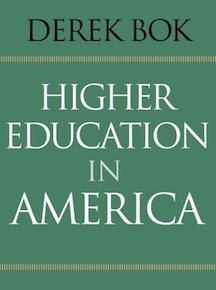By Richard M. Berrong
I had imaged that this would be a 200-page book set in large type with wide margins in which Bok, a former president of Harvard, reflected on the state of higher education in America as seen from a non-normative position at the top of the pyramid. Instead, it turned out to be a 400+-page tome set in smaller type with plenty of footnotes in which Bok reviews, synthesizes, and extrapolates from a lot of the contemporary research on what American colleges and universities of all sorts are doing wrong and right, and where that situates them and us among our industrial and economic rivals around the world.
As he explains at one point, “the United States currently ranks near the bottom of twenty-seven economically advanced countries in the percentage of students starting college who graduate.” While we keep sending a greater percentage of people to college, no more are graduating: “Today, the percentage of 25- to 34-year olds with a BA degree barely exceeds that of their parents’ generation.” Not only does this mean that our colleges and universities have become less “efficient” than they were in the past, burning through a great deal of money that does not produce graduates. It also means that we are falling behind our economic rivals in our ability to compete in the global economy.
Bok doesn’t put all the blame for this on American higher education, of course. He recognizes that by any standard we are sending many to college so poorly prepared that they are unable to succeed, even when given a few remedial courses that, studies show, do not really remediate. Nor does Bok advocate lowering standards to increase graduation rates. Rather, he repeatedly cites studies that show less is being demanded of American college students today while grades are being inflated, and argues that this will leave the United States with a populace poorly prepared for tomorrow’s ever more competitive global economy.
He therefore spends much of this book considering how American comprehensive universities will need to change if they are to deal successfully with ever more students in an era where, “at present, only about one third of high school graduates are prepared to do college work successfully.”
He also deals with the money issues. “From 1982-84 to 2010,” he reports, “college tuition and fees (unadjusted for inflation) rose by 439 percent,” whereas “the consumer price index climbed by 106 percent.” This has mostly been the result of significant declines in state subsidies; they built lots of universities in the 1960s that they no longer fund adequately. The result is that too much of the American public is now being forced into too great debt to meet educational costs that states have shifted to the student. “Tuition cannot go on forever increasing faster than family income,” however, Bok observes, not when it means that students are now routinely leaving college with debt that amounts to twice what they can hope to earn in a year even if they get a job in their chosen field.
This means that colleges, in particular comprehensive universities that are feeling the pinch of reduced state subsidies but cannot raise money from private sources or tuition as the best privates do, will have to find ways of cutting costs. Bok considers possible ways, even cutting intercollegiate athletics, though he recognizes that some of the methods he proposes have little chance of being adopted.
This is not a page-turner. It is not meant to appeal to those critical of American higher education who want a few flashy, apparently simple solutions. But that is what makes it valuable and worth reading by those who realize that the problems facing American higher education are not simple and cannot be fixed simply. Rather, as Bok argues convincingly, they require consideration of many factors and undertaking carefully thought through change that takes all those factors into account.
Richard M. Berrong (ΦBK, University of Virginia, 1973) is a professor of French at Kent State University, Director of their Master of Liberal Studies program, and a resident member of the Nu of Ohio Chapter of Phi Beta Kappa.




